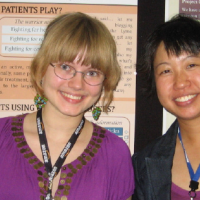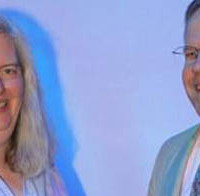Highlight on Grad Cohort Alum Elaine Chang
Originally Printed in Summer/Fall 2010 Newsletter
Elaine Chang is a Program Manager at the Microsoft Redmond office, where she started in 2006. She at-tended the 2004 CRA-W Grad Cohort and graduated with a MS from the University of British Columbia.
Q: How did you become interested in pursuing a career in computer science?
Growing up, I was always fascinated by the rapid de-velopment of modern technology. When I first started university, I was very interested in how technology could be applied everywhere to improve our lives, so I chose a few Computer Science courses in the first year. I enjoyed those courses so much that I then chose Computer Science as my major. In addition to Computer Science, I was also looking for something that’s more interdisciplinary, so I did a minor in Business Administration.
Q: How did your graduate experience influence your career path?
My graduate experience exposed me to academic research and what a career in academia might look like. This helped me decide whether to continue in academia and pursue a PhD or start my career in industry. I was also engaged in the graduate student society and started a mentoring program for graduate students, which connected us with mentors in academia and the corporate world. This gave me a good understanding of what the two types of career paths, academia or industry, look like, and I found that I was more passionate about a career in industry. I enjoy the business side and creating a direct and immediate impact on products for end users.
Q: Where did you start your career? How did you get to your current position?
I started my career as a Program Manager at Microsoft. I have enjoyed this role so much that I haven’t made any change in the role but mainly changed projects and teams, and expanded my scope of influence.
Q: What does your work involve? How much programming” does your job involve?
As a Program Manager, I am responsible for driving the technical vision, design, and implementation of next generation software solutions. I provide leadership throughout the products’ life cycles. My work involves designing the software solutions, authoring technical specifications, including envisaged usage cases, customer scenarios, prioritized requirements lists, design details, and design considerations, managing feature sets throughout the product lifecycle, and driving the design through to completion. I help transform product visions into elegant designs that will ultimately turn into products used by worldwide Microsoft customers. This involves anticipating customer needs and creating outside-the-box solutions for them.
My role is to work directly with other key disciplines including Software Development Engineers, Software Development Engineers in Test, Usability, Product Design, Product Planning, User Assistance, Localization, Marketing, and Sales. I am not required to write code myself. I am, however, expected to be technical and understand code in order to work effectively with developers and testers. This blog entry from blogs.msdn.com describes it well: “Where developers were focused on code, architecture, performance, and engineering, the PM would focus on the big picture of ‘what are we trying to do’ and on the details of the user experience, the feature set, the way the product will get used. In fact the job has matured significantly and it is almost impossible to document a complete list of the responsibilities of program management.” Feel free to read the blog.
Q: What do you think the biggest challenges are in terms of working in the corporate environment?
Comparing the corporate with the academic environment, one of the biggest challenges in the corporate environment is that changes are much more frequent and sometimes quite unexpected. These changes could include projects, products, organization structures, and management. However, this is also the reason why I prefer the corporate environment, where you are more likely to see your impacts much sooner.
Q: How have your interactions with CRA-W affected your career?
My interactions with CRA-W have affected my career in a few very positive ways. In the first year of my graduate studies, I was fortunate to be offered the opportunity to attend the first CRA-W Graduate Cohort in 2004 in Seattle. I had such a great time visiting Seattle for the first time, which certainly had a positive influence on my decision later to join Microsoft at its headquarters in Redmond as my first job after graduate school. It was also the first CRA-W Grad Cohort that showed me what the different career paths are for a graduate student in Computer Science, and what their pros and cons were. It was not a choice of which one is better, but rather which one was more suitable for me and which one I felt more passionate about. That inspired me to learn more about myself and later on to choose the non-academic career path.
It was also that same CRA-W Grad Cohort where mentoring was a great topic discussed. Those mentoring discussions inspired me to found the Tri-Mentoring program for graduate students in the Computer Science department at UBC in 2004 after I returned from the cohort. I also created a “Graduate Mentoring Program Coordinator” role in the official UBC Graduate Student Association committee. I have since then been practicing mentoring both as a mentee and a mentor. Through these experiences I have learned from not only my mentors but also my mentees, which has indirectly helped me grow both in my career and as a person.
Q: Have you been involved in other activities that support women in computing?
As a graduate student at University of British Columbia, I was a Graduate Student Representative in the “Focus on Women in Computer Science” committee. I have also participated and organized various women in computing events, including co-organizing a few GirlSmart HeadSmart Workshops, a full-day of hands-on computer science activities for girls in the sixth grade, followed by a panel discussion with women working in computer science.
I also attended the Grace Hopper Celebration of Women in Computing 2004 as a scholarship student. After I joined Microsoft in 2006, I attended Grace Hopper Celebration of Women in Computing 2006 as a representative from Microsoft. I have been continuing my support every year for the UBC Tri-Mentoring Program as an industry mentor. In addition, I was also a speaker in a panel on “Women in Computer Science” sponsored by Microsoft when we visited the UBC campus to share my experiences with current undergraduate and graduate students. The panel event was so successful that a girl who came to talk to us afterward told us that she almost decided to drop out of Computer Science before this talk, but this panel gave her the confidence to still pursue her interest in Computer Science.
Q: How do you balance life outside of work with your career objectives?
I think the most important thing is a balanced mindset. I believe that work should not be the only focus of my life. I therefore consciously think about allocating time to spend with my family and friends and also on my hobbies. For example, I love dancing and I am a board member of a local (Chinese) Dance Troupe. We perform in various local cultural events. I also love traveling and try to visit a new country every year. It can be hard to find time for all the different activities one might be interested in, but most often you will really find that it is actually not about time but more about priority, whichever activity you think has a higher pri-ority is the one that should get the time. I am still im-proving my prioritization, but I do find that the more time I get to spend on my various hobbies, the happier I feel, and the more energized I am at work as well.
Q: Do you have any advice for someone who might wish to follow your career path (or other career path advice)?
Here are a few thoughts to share:
- Follow Your Passion: Spend more time to learn about yourself and discover your own passion, then follow your heart to choose a career that aligns with your passion: you are much more likely to succeed if you love what you do and do what you love!
- Trust Yourself: If you don’t think you can do it, then you are probably right since you don’t even believe in yourself; so trust yourself, especially your potential and don’t be afraid of dreaming big!
- Always Focus on Self-Development: Opportunities are for those who are well prepared, so get prepared by focusing on self-development. This way you are more likely to be ready for any opportunities that may come your way.
You can do it. Good luck!






